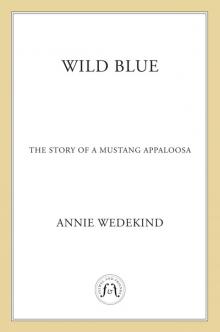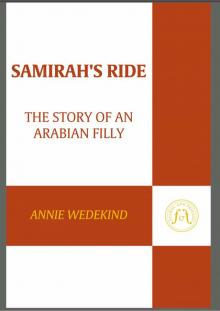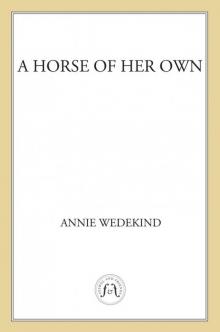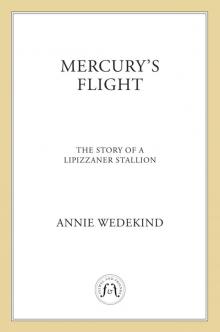- Home
- Annie Wedekind
Samirah's Ride
Samirah's Ride Read online
SAMIRAH’S
RIDE
THE STORY OF AN
ARABIAN FILLY
Annie Wedekind
Feiwel and Friends · New York
For Miriam
A FEIWEL AND FRIENDS BOOK
An Imprint of Macmillan
SAMIRAH’S RIDE. Copyright © 2010 by Annie Wedekind. All rights reserved.
Distributed in Canada by H.B. Fenn and Company Ltd. Printed in
May 2010 in the United States of America by World Color Press Inc.,
Fairfield, Pennsylvania. For information, address Feiwel and Friends,
175 Fifth Avenue, New York, N.Y. 10010.
Library of Congress Cataloging-in-Publication Data Available
ISBN: 978-0-312-62268-8
Book design by Barbara Grzeslo
Feiwel and Friends logo designed by Filomena Tuosto
First Edition: 2010
10 9 8 7 6 5 4 3 2 1
www.feiwelandfriends.com
Dear Reader,
Welcome to the Breyer Horse Collection book series!
When I was a young girl, I was not able to have a horse of my own. So, while I dreamed of having my own horse one day, I read every book about horses that I could find, filled my room with Breyer model horses, and took riding lessons.
Today, I’m lucky enough to work at Breyer, a company that is known for making authentic and realistic portrait models of horse heroes, great champions, and of course, horses in literature. This beautiful new fiction series is near to my heart because it is about horses whose memorable stories will take their place alongside the horse books that I loved as a child.
This series celebrates popular horse breeds that everyone loves. In each book, you’ll get to appreciate the unique characteristics of a different breed, understand their history, and experience their life through their eyes. I believe that you’ll love these books as much as I do, and that the horse heroes you meet in them will be your friends for life.
Enjoy them all!
Stephanie Macejko
Breyer Animal Creations
When Allah willed to create the horse, He said to the south wind:
“I will that a creature should proceed from thee—condense thyself!”—and the wind condensed itself. Then came the Angel Gabriel, and he took a handful of this matter and presented it to Allah, who formed of it a dark chestnut horse, saying:
“I have called thee horse; I have created thee Arab, and I have bestowed upon thee the color koummite. I have attached good fortune to the hair that falls between thy eyes. Thou shalt be the lord of all other animals. Men shall follow thee wherever thou goest. Good for pursuit as for flight, thou shalt fly without wings. Upon thy back shall riches repose, and through thy means shall wealth come.”
—Letter of the Emir Abd-El-Kader,
from Horses of the Sahara, by E. Daumas
CHAPTER 1
Full of fire and full of bone,
All his line of fathers known
My name is Samirah—Sami for short, since I live on a ranch where almost everyone acquires a nickname. My old master came into this world as Jedediah Munk, and will leave it as Red. His wife, Mrs. Gloria Munk, is Miz M. Among her employees are a bearded, burly hand called Peach and a weedy fellow known as Bull. Even regular visitors get nicknamed: My farrier, April, is always called May, and the vet, Dr. McGowan, answers to Doolittle.
One of the few people called by her proper name is my companion, Jasper Munk, age twelve. Perhaps it’s because she has an unusual name for a girl—almost like a nickname and a real name rolled into one. Or perhaps it’s because she’s known to kick, hard, if called anything else. “Freckles,” “Pumpkin,” “Carrot,” “Slim”—all have been tried and all have painfully failed.
So I am Sami, Arabian mare, companion to Jasper, and member of the herd at the Cold Creek Ranch.
I was three years old when Red purchased me as a birthday gift for his then nine-year-old daughter and only child, Jasper. I was (and am) considered quite clever, so although at age three I was only halter-broke, Red decided that I would be a suitable friend to keep his daughter company.
“Both smart. Both redheads. Help me keep her out of trouble, won’t you, Sami?”
I promised to try, and Red palmed me a carrot. Though he demanded much, Red had a generous spirit—like the rest of his family, as I was soon to discover.
I had an immediate affinity with Jasper—or she with me. After our many adventures together, it’s difficult to know how much of her has been formed by me and how much of me has been molded by her. But, in the very beginning, her heart spoke to me as readily and as clearly as her voice and her hands, and both of these greeted me as if we had long been friends. And—who knows?—perhaps we always have been. I’m a great believer in destiny and history, as is Jasper, and perhaps we share a destiny, as much as we share a history.
“Is she mine? Is she mine?” the small girl cried as I stepped off the trailer on that warm spring day, and her soft hands flickered over my coat, my mane, returning over and over to my muzzle.
“I think it might be the other way around,” Miz M said, and Red laughed.
Yes, I’m yours, I thought. She was so particular, so different, and yet familiar despite her strangeness. We were both very young creatures, after all. Jasper, at nine, was her future self in miniature: slender and supple as a new blade of grass, with a tangle of hair almost the exact shade of dark red as my coat and clear gray eyes shining from her riotously freckled face. She was the smallest and the newest human I had ever met, and her fillyish excitement was infectious. My hooves danced in time with her skipping boots, and I breathed in her warm, flowery scent of the open fields where she played.
“Look at her nose, Daddy!” Jasper cried. “Look how big she’s breathing!”
“That’s why they call Arabians ‘Drinkers of the Wind,’ ” Red told her. “Those big nostrils help them run fast, and to take in the world.”
“She’s going to run fast?” Jasper whispered. “Really fast?” Her feet went still, as did her hands. She stared up at me with fierce concentration.
“Oh yes,” Red said. “But not just yet—at least, not with you aboard, Jasper. Sami’s just a filly, and she’s got a lot of learning to do. As do you, young lady.”
And so it was that Jasper and I began our mutual education.
. . .
Cold Creek Ranch is perched on a gentle bluff overlooking the Green River, in the northeastern part of the state of Utah. The barn is very old but has become more solid and substantial with age, as if all the years of careful cleaning have polished it to a deep, mellow shine. (I suppose the same could be said for the main house, but I’ve never been in it.)
There was so much to see, to smell, and to listen to during the first days when I settled into my new home. Jasper was my primary guide, but I learned a great deal from the ranch’s other humans and, eventually, even more from its horses. I soon struck up a friendship with Chief, a sturdy bay quarter horse who is ridden by the cowboy Peach. Chief was as easygoing and companionable as his rider—and much less intimidating than Cold Creek Ranch’s lead mare, Magpie. With her glossy black-and-white coat and long, sweeping tail, Red’s companion does indeed resemble the bird that is her namesake. She rules the herd with a benevolent despotism that, as a young filly, I did not fully appreciate. Almost as soon as we met, our wills clashed.
I am the daughter of a lead mare. My gentle mother, Sola, brightly colored, spirited, and swift as flame, governed the small herd in which I grew up. Her manner of leading and Magpie’s were quite different, I soon found. Or perhaps I should say that life as the daughter of a lead mare and life as a young outsider were quite different.
I spent my first three days at the ra
nch in a roomy paddock near the barn. There was a bit of grass for grazing, and Jasper brought me a daily ration of hay and oats, as well as kept the drinking trough fresh. The paddock was an excellent vantage point for observing the workings of the ranch. In the morning, I watched the herd gather near the gate in answer to Peach’s low whistle; then each horse was hitched to a post while Peach, Bull, and Jasper brushed the mud from their legs, picked hooves, and untangled manes and tails. Jasper had a little blue bucket she stood on to reach the taller horses. I’m afraid she wasn’t much use to the ranch hands those mornings, for she was always skipping over to my paddock to make sure I didn’t feel left out. There was hardly any muck, or room to muck about, in my pen, but she gave me a thorough polishing and combing each morning—I don’t think I’ve been so clean since.
After the grooming, the horses were saddled and bridled. I was quite impressed with how workmanlike the herd seemed—quietly taking the bits, looking about them with interest, flickering an ear back to the people as they discussed the day ahead.
“Me and Chief will move the cows to the south pasture,” Peach told Bull. “You get the trail ride, Bull, and Jasper, Miz M needs you in the house.”
Jasper, unlike the horses, did not take this quietly.
“Aw, Peach, no! I need to lead Sami around and show her the creek and the best spots for drinking, and the view from the big hill, and her stall where I put up her new halter, and—”
Peach was grimacing in a way that looked entirely sympathetic to Jasper and wishing he had different orders for her, but just then her mother’s voice sailed down from the kitchen window: “Jasper Munk! I need you as soon as you finish with the horses. We’ve got more guests coming tomorrow and beds to make and bread to bake and bathrooms to clean. Sami’s tour can wait till after lunch.”
Jasper’s face was pink with fury and she kicked the hitching post so hard that Chief snorted an admonishment.
“I hate guests,” she muttered. “Wish we were still a real ranch. Dumb old city slickers who don’t know a thing about horses. Dumb old cooking and laundry . . . like I’m a maid instead of a cowgirl . . .”
Much of this was lost on me at the time, but as Jasper stalked toward the house, misery written in every small, tense muscle, I whinnied to her. She stopped, turned, and pelted back to me like a tiny foal to its mother. She flung her arms around my neck, swore to come back as soon as her chores were finished, and seemed in a slightly better humor after petting me about two dozen times.
. . .
In the days that followed, as Jasper and I took long walks over the property, I learned what my companion had meant when she longed for a “real” ranch. I suppose I had been brought up on such a place, where raising horses and cattle were the humans’ livelihood. And the Cold Creek itself had once been a thriving cattle outfit, according to Jasper, who was as proud of her family’s history—her heritage—as I am of mine.
My family comes from the central Arabian desert—bred by Bedouins to be strong, fast, hardy, and loyal to our human companions. My ancestors were the nomadic tribesmen’s wealth and pride, and valued members of their families. My mother and my grandmother told me stories of the legends from our distant past, much as Jasper’s father instilled in her a pride of place. For me, the place is not the source of pride—it’s the blood of the Arabian that flows through my veins. That, I can take with me.
But I am getting ahead of myself. These are lessons I tried to teach Jasper, in my own way. When she thought she had lost her home, she felt she lost everything. The Arabian has long known that home is where your herd is, where your family is, and that, as we learn during our far-flung and well-traveled lives, can be anywhere.
But Cold Creek Ranch was Jasper’s home, and perhaps the waters of the Green River flowed in her veins. This was a majestic and noble land—I sensed that from the moment my hoof first touched down from the trailer and I inhaled the lush, fresh fragrance of well-watered grassland, the pink-and-white-flowering salt cedar trees, and the pungent aroma of sage and greasewood. Far from any town, nestled near the banks of the great river, and cupped in the foothills of a series of rocky mountainsides, the ranch was almost as ageless as my ancestral desert sands. During my early days in the corral, I yearned to run those fields, to drink from the river, even to explore the mountain ranges. I fear I was as difficult to contain as Jasper, though I tried to remember my training and to be patient.
The first walks that Jasper and I took satisfied some of our need to be free. Red decided I should “settle in” for a few days (hence the corral) before I was introduced to the herd (he couldn’t have known that these introductions were performed the same day I arrived, though from a distance), so Jasper and I were alone in our explorations. She showed me the pasture where I would live, the shady banks of the two streams that branched out of the river, let me sniff over the ranch’s buildings, from the horse barn to the cattle shed, the flourishing vegetable garden just outside the kitchen of the main house, and even showed me the remains of her ancestors’ original dwelling—a curious little house like an animal’s cave, built directly into the side of a rounded slope, with earth and grass as its roof. In their long-gone century, the ranch had been, to Jasper’s mind, “real”: Those first Munks had raised their cattle, their horses, built a ferry to cross the river, even established a store to serve the needs of this small pioneer outpost. Now, of course, it was all different.
“It’s the guests,” Jasper explained to me on an early walk. “After Grandpa died, Dad decided we could only keep the ranch going if we took in tourists. So he built those cabins”—here she pointed out a series of neat, small lodgings scattered some distance from the house—“and basically turned everything into a hotel or something. But like a hotel with activities—you know, fishing, riding, playing cowboy with the poor old cows. It’s just . . . silly.”
I was reminded of a relative on my father’s side—an unusually tall gray—who had been sold to the circus. He spent his days pretending to be a wild stallion—he was, in fact, a gelding—who was “tamed” by a series of stunt riders who jumped around on his back like frogs. I snorted sympathetically. A horse knows about the human fondness for playacting.
“The worst thing is all the chores,” Jasper went on. “My mom treats me like a servant when we have guests. And Dad and Peach always tell me to mind her. I don’t mind helping—really—I just hate helping in the house. Wish we could get somebody else to do it. Wish I could just help outside and in the barn. Dad says when I’m older . . .”
Here she paused and lay her small cheek against my shoulder, her right hand reaching up to twist her fingers through my mane. I sighed, relishing the feel of the warm June sun on my coat, drinking in the tantalizing smell of the grass. I lowered my head to graze, and Jasper let me, sinking down herself and inserting a blade of grass between her teeth.
“Jasper, you watch that filly doesn’t step on you, now,” came Bull’s reedy voice from behind us. “It ain’t safe to lie down on the ground with an unbroke horse on top of you.”
“Don’t be silly, Bull,” she reprimanded. “Sami would never step on me.”
Indeed not. I shot a cool glance at the ranch hand and made a point of lifting my hooves prettily as I moved to a new, tufty patch. Red had brought me to Cold Creek to be Jasper’s horse, and no Arabian worth her blood would take that responsibility lightly. I was spirited, young, flightier than I am now, but never unaware of my human companion and my duty to her. Yes, I longed to run free over those beautiful meadows, longed to fully meet the herd that I was to join, but while I was tethered to Jasper by my halter and lead rope, I would be patient, calm, and well mannered. Anything less would be a betrayal of my heritage.
Arabians are often accused of pride, but I don’t think that it’s a fault unless combined with arrogance or bullying. I am proud of my bloodlines, and I am proud of myself—I feel in the soundness of my stride, the high carriage of my tail, the coiled energy in my quarters, the impress of the
ages. Even my color, koummite, or blood bay, is the shade of the First Horse. I was made to carry prophets and kings, warriors and raiders. And Jasper.
CHAPTER 2
Give the preference to mares; their belly is a treasure, and
their back a seat of honor
After three days in the corral—comfortable, but confining—I finally got to join the herd.
That morning it was Red, not Jasper, who came to fetch me, though of course Jasper shadowed his heels and had lots of instructions for how to handle me, to which her father lent a tolerant ear. She showed him how I liked to eat my carrots (tip up, not lying in the palm), but I wasn’t very interested in the treat. I could sense that today was different. Not only was the morning routine changed, with Red’s hand at my halter, but I felt a watchfulness and a certain tension from the herd just beyond the double line of the corral and pasture’s fences.
I said that the herd and I had already introduced ourselves from afar—that is, we caught one another’s scent and neighed back and forth to confirm their possession of the territory and my status as an outsider. I expected this. My mother had told me that as a newcomer, and a young filly, I would not have the same rank as I held in my old herd as cherished daughter of a respected lead mare. I was both eager to fully meet the other horses and wary.
As Jasper opened the corral’s gate and Red led me through, I couldn’t contain the excitement and nervous energy that rippled through my body. All of my senses were keyed to their highest, my ears strained forward so that the tips nearly met in the middle, and I pranced in place.
“Steady on, girl,” Red said, his gravelly voice as reassuring and calm as ever.
“She’s excited, isn’t she, Dad?” Jasper smiled up at both of us.
“Just like you on the first day of school.” Red chuckled. “To her, all these horses are like new boys and girls to meet. Well, guess Magpie’d be the teacher.”

 Wild Blue - The Story of a Mustang Appaloosa
Wild Blue - The Story of a Mustang Appaloosa Little Prince - The Story of a Shetland Pony
Little Prince - The Story of a Shetland Pony Samirah's Ride
Samirah's Ride A Horse of Her Own
A Horse of Her Own Mercury's Flight - The Story of a Lipizzaner Stallion
Mercury's Flight - The Story of a Lipizzaner Stallion